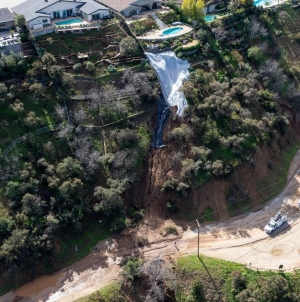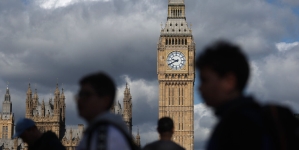-
Harris Takes Forceful Tone With Israel in a Foray Into Mideast Diplomacy - December 5, 2023
-
A portion of Mulholland Drive, damaged by mudslides in winter storms, reopens - May 26, 2024
-
‘Maybe You Don’t Want to Win’ - May 26, 2024
-
Donald Trump Putting Law Enforcement in Danger: Attorney - May 25, 2024
-
Avoid the waters of these 5 L.A. County beaches this holiday weekend, public health officials say - May 25, 2024
-
Bawdy Comedy ‘Anora’ Wins Palme d’Or at Cannes Film Festival - May 25, 2024
-
Map Shows Heat Wave Zone Spread Into Five New States - May 25, 2024
-
Azusa police arrest suspected slingshot-wielding vandal - May 25, 2024
-
Donald Trump Hammers Judge Ahead of Jury Instructions - May 25, 2024
-
Sometimes U.S. and U.K. Politics Seem in Lock Step. Not This Year. - May 25, 2024
Harris Takes Forceful Tone With Israel in a Foray Into Mideast Diplomacy
Vice President Kamala Harris’s trip to the Middle East over the weekend was both a major foray into wartime diplomacy and an effort to show that the administration is taking a harder line with Israel about the civilian toll of its war against Hamas.
The message was aimed at leaders in the region as Israel begins a new phase of the eight-week-old war, which has killed thousands of civilians. But the vice president was also speaking to disaffected voters in the United States, especially the young voters and people of color who helped propel President Biden to the White House in 2020.
Over the course of just three hours at the U.N. climate summit in Dubai, Ms. Harris juggled four high-stakes meetings or calls with kings and presidents. Her message on the war, privately and publicly, was one of the most pointed pronouncements from any American official — including Mr. Biden — establishing guidelines for how Israel should fight its war and what the country should do once the fighting is over.
“Under no circumstances,” her office wrote in describing her remarks in a face-to-face meeting with President Abdel Fattah el-Sisi of Egypt, “will the United States permit the forced relocation of Palestinians from Gaza or the West Bank, the besiegement of Gaza, or the redrawing of the borders of Gaza.”
Jake Sullivan, the president’s national security adviser, said on Monday that “there’s no daylight” between the vice president and Mr. Biden, who have both expressed support for Israel and talked about the need to protect civilians in Gaza. White House officials said Mr. Biden himself has been blunt with Prime Minister Benjamin Netanyahu of Israel in many private conversations.
But over the weekend, Ms. Harris was the messenger of choice to deliver that admonition in a very public way.
Her comments echoed Secretary of State Antony J. Blinken, who said in Israel last week that it was imperative that Israel have a “clear plan in place that puts a premium on protecting civilians.” And Defense Secretary Lloyd J. Austin III on Saturday warned in a speech that if Israel drives civilians into the arms of terrorists, it would risk replacing “a tactical victory with a strategic defeat.”
For the vice president, the trip was a chance to seize the international spotlight in a way that has not happened despite several overseas trips in the past year. Mr. Biden prides himself on a half-century of global engagements, but Ms. Harris has begun building her own history of relationships with leaders in the region, as well.
She has met with President Isaac Herzog of Israel three times. She has had three meetings with King Abdullah II of Jordan, including one at her residence in Washington. And she first met Sheikh Mohamed bin Zayed Al Nahyan of the United Arab Emirates in May 2022, when she led the delegation to the funeral of his predecessor.
In her weekend discussions with all three, the vice president was intentionally forceful in her language, according to senior administration officials familiar with the preparations as Ms. Harris and her aides scrambled to set up the visit late last week.
One official said her remarks were designed to match the appetite in the Arab world for a set of principles that should guide how the war is carried out and how the region should approach its aftermath.
Her message about avoiding any future displacement of Palestinians was aimed primarily at Mr. el-Sisi of Egypt, who has said he would not accept a wave of refugees from Gaza. Her message about Gaza’s borders was a direct response to concerns from Arab leaders about comments from some Israeli leaders about creating a secure buffer zone inside Gaza after the war ends.
The official said the messages were also aimed at Israeli leaders.
Ms. Harris did not stop in Jerusalem on her way home from Dubai on Sunday, but she called Mr. Herzog from Air Force Two.
“I have spoken with members of the Palestinian, Arab and Muslim communities of America, including those who have lost loved ones in Gaza and American citizens who are injured and evacuated from Gaza,” Ms. Harris said in remarks to reporters after meeting with the Arab leaders in Dubai. “It is truly heartbreaking. As Israel pursues its military objectives in Gaza, we believe Israel must do more to protect innocent civilians.”
Several administration officials said the vice president is also aware of the audience back home in the United States.
Some Democrats have said they will not vote for Mr. Biden next year because they say he has not held Israel’s feet to the fire when it comes to protecting civilians in Gaza. Aides to the vice president say her tough remarks were aimed in part at reassuring Americans who hold similar views.
The health ministry in Gaza said Israeli strikes have killed more than 15,500 people since Oct. 7, when Hamas launched a surprise attack on Israel. About 1,200 people were killed in the attack, Israel officials said.
In recent weeks, Ms. Harris has traveled to college campuses around the country, as polls suggest Mr. Biden’s support among younger voters has been waning. She has talked about abortion rights, student loans, the economy and, more recently, the Israel-Hamas war.
At an event at Northern Arizona University in Flagstaff, Ariz., 10 days after the Oct. 7 massacre, Ms. Harris noted that “it is important to recognize also the distinction between a terrorist organization Hamas and the Palestinian people and civilians, and they should not be conflated.”
In the nearly two months since, her language has become more blunt, reflecting the thousands of civilians that have died in Gaza and the length of the fighting, which resumed on Friday after a weeklong pause in hostilities to exchange hostages and prisoners held by Hamas and Israel.
White House officials said Ms. Harris was in Dubai primarily as the country’s envoy to the U.N. climate summit known as COP28. But her focus during her one day at the conference was on the war in the Middle East.
She delivered official remarks for the United States on the climate, which, like other leaders’ remarks, were limited to about four minutes. And she missed nearly all of the one other climate event she was scheduled to attend.
At that event, the moderator of the panel on renewable energy appeared confused when Ms. Harris was not in the room to be introduced. After a few awkward moments, the moderator said she would keep a seat open for the vice president, in case she arrived.
Ms. Harris was not far away, in another part of the sprawling expo center. She was on the phone with the emir of Qatar. (Many of Hamas’s political leaders live in Qatar, which has long acted as an intermediary for nations that refuse to deal directly with Hamas.)
The vice president arrived just as the last of the other panelists spoke. After delivering her brief climate remarks, Ms. Harris hurried off the stage for her meetings with the king of Jordan and the president of the United Arab Emirates — just as the moderator was asking for the panelists to come together for an official photo.
Not yet out of the room, Ms. Harris raced back up to the stage, smiled broadly for the camera and then raced out of the room.
Moments later, she was shaking hands with Sheikh Mohamed, the Emirati leader.































